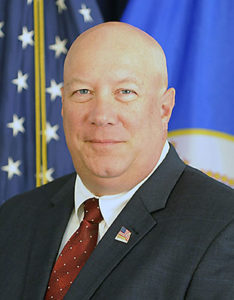By Larry Herke
from March 2022 issue of The Minnesota Legionnaire
During the cold Minnesota winters, we are reminded of the importance of a warm and safe place to live. Sadly, for hundreds of Minnesota veterans, homelessness has become a way of life.
Since 2014, the Minnesota Department of Veterans Affairs (MDVA) and dozens of community partners have collaborated to effectively end veteran homelessness in our state, with the goal to become the fourth state in the nation to do so.

We have made great progress. Seven of 10 Continuums of Care (CoCs) across the state have already declared an end to veteran homelessness in their communities. These CoCs make up 84 of the 87 Minnesota counties. The most recent was the Central Minnesota CoC that celebrated this milestone in November.
The three remaining CoCs that continue to work toward this goal are Hennepin, Ramsey and St. Louis counties.
We define effectively ending veteran homelessness as communities adopting a comprehensive response system that ensures homelessness is prevented whenever possible. If it cannot be prevented, homelessness will be rare, brief and a one-time experience.
After seven years, MDVA has learned many lessons that have allowed us to move closer to our goal.
Secure housing where veterans desire to be housed: A crucial step to a successful housing placement is ensuring that veterans find affordable units where they want to live.
Work with local communities and landlords to secure housing: MDVA is working to increase understanding and awareness of our mission and veteran resources available to secure buy-in from the community.
Subsidize housing and services with state and federal resources: MDVA relies on veteran subsidy and grant programs to provide rental subsidies and supplemental wrap-around services to veterans who qualify. In April, MDVA, in collaboration with community partners, will launch a comprehensive program that funds additional rental assistance and services to veterans who are unable to access federal resources.
Close gaps, address barriers by connecting veterans to mainstream resources: Not all veterans on the Homeless Veteran Registry are eligible for all veteran-specific state and federal assistance programs. MDVA seeks to connect veterans with mainstream resources where available.
Stabilize at-risk veterans with additional MDVA programs: MDVA’s State Soldiers Assistance Program’s (SSAP) Subsistence Program, SSAP Special Needs Grant program and SOAR (SSI/SSDI, Outreach, Access, and Recovery) program provide additional benefits to Veterans who qualify.
Provide incentives for landlords and partners: Lack of available rental units is one of the biggest challenges. MDVA is addressing this shortage by incentivizing landlords to offer a veteran a home.
Align with the statewide “Heading Home Together” plan: This plan uses shared goals, principles and strategies that spur actions to prevent and end homelessness in Minnesota.
Address diversity, equity and inclusion: There is a clear overrepresentation of veterans of color experiencing homelessness compared to the general population of veterans in Minnesota.
Seek legislative support: During the current Minnesota Legislative session, MDVA is seeking new funding for three initiatives:
• Tenancy supports and landlord engagement activities.
• Low-barrier, permanent supportive housing for veterans.
• Increased engagement and outreach activities.
To learn more about our efforts to end veteran homelessness, visit MinnesotaVeteran.org/EndHomelessness.
Larry Herke of Sauk Rapids is the commissioner of the Minnesota Department of Veterans Affairs. He is a member at Hastings Post 47.